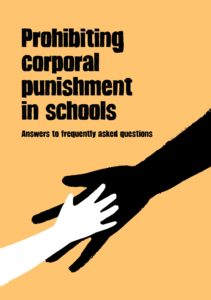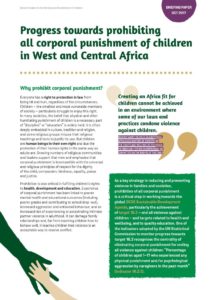Guest feature: E4P tackles violence in Nigerian schools
Why this matters
Corporal punishment in schools violates children's right to education, health and development, and to freedom from violence, and has been shown to negatively affect educational outcomes and contribute to school drop-out. Governments are obliged under international law to prohibit corporal punishment for all children in all schools and ensure that school discipline methods respect children’s human dignity and conform with the UN Convention on the Rights of the Child.
Tackling Violence in Nigerian Schools: E4P Schools Without Violence Campaign
According to the 2014 National Survey on Violence against Children in Nigeria, one out of every three children has experienced physical violence from their parents and teachers and have come to see this as normal. Although Nigeria was recently confirmed by the Global Partnership to End Violence Against Children as one of the “pathfinding countries” that have made formal commitments to ending violence against children, there is insufficient evidence in practice that indicates this commitment. For instance, certain legal frameworks such as article 295(4) of the Criminal Code (South) still legally allows the correction of children using force. This is in conflict with the 2003 Child Rights Act and undermines its implementation.
Further, although some teachers are aware of certain prohibitions to the use of corporal punishment in schools as contained in the 2003 Child Rights Act, corporal punishment is still an acceptable form of discipline used in schools in Nigeria.
Our E4P Schools Without Violence Campaign was launched in March 2019 within the context of:
- 2030 Agenda for Sustainable Development, particularly SDG 16.2 to “End abuse, exploitation, trafficking and all forms of violence and torture against children”,
- Agenda 2040: Fostering an Africa Fit for Children, under which states have committed to ensuring “Every child is protected against violence, exploitation, neglect and abuse” including that no child is subjected to corporal punishment (aspiration 7), and
- The Global Safe to Learn campaign by the UNICEF and others which was introduced at the World Education Forum in January 2019.
Campaign Overview
The aim of our campaign is to tackle violence embedded in relations in schools in Nigeria applying an African-centred holistic approach. For teacher-student relations, our focus is on tackling violence against children embedded in the use of corporal punishment and for student-student relations, we are focused on tackling bullying and gender-based violence.
This campaign has two immediate components. The first component of the campaign is the online discussions and bi-monthly radio talks. Our aim with this is to transform norms beyond the borders of schools by pushing the conversation of effective positive discipline to replace the use of corporal punishment and beating of children in Nigeria. Our radio talks have focused on collecting information on the general perception about the use of corporal punishment in Nigeria, justifications presented for its use, discussions on alternative positive disciplinary methods and disseminating information on the 2003 Child Rights Act.
Findings from our radio talks revealed that although people are increasingly becoming more open to exploring positive nonviolent forms of discipline, corporal punishment is still generally not regarded as violence against children but rather backed up by the misinterpretation of religious texts such as “spare the rod and spoil the child”.
Also, over forty percent of those who contributed to our radio discussions conceptualised beating children as a “moral orthopaedics” responsible for moulding individuals into respectable adults. For instance, a female caller narrated an incident of how her father violently beat her and how this incident caused her to be more “obedient and responsible”. This is a very sad example of normalisation of violence interpreted as discipline. Moreover, the discussions revealed that positive nonviolent forms of discipline are commonly generally perceived in Nigeria to be less effective in correcting children when compared to the use of physical corporal punishment. We are currently using these findings to shape other components of our campaign.
Future campaign plans
Subject to funding, the second component of this campaign in schools is slated to kick off in September 2019 in Port Harcourt, Nigeria. We will organise workshops with teachers on alternative positive forms of discipline, assist school authorities in creating child protection and safeguarding documents that clearly outline the difference between discipline and violence against children as well as organise masculinity sessions with boys in the school to encourage them to redefine their masculinity away from the use of violence and bullying.

Stock image by Andrew Smith. Link to original source
Guest writer
Noelle Omesham Chuks-Eboka, Executive Director, Education for Purpose Initiative (E4P)
Noelle Omesham Chuks-Eboka is the Executive Director of Education for Purpose Initiative(E4P) and a Doctoral Researcher in Development Studies department at SOAS, University of London. She also has a postgraduate degree in International Development with Distinction from the University of Westminster, United Kingdom.
Her current academic expertise and interest include qualitative research on school bullying, violence and gender issues in Nigeria. Following this, both her research and work in the Development sector focus on ensuring that schools are safe spaces for children by tackling institutionalised violence in schools. She is also passionate about strengthening access to free and quality education for out-of-school children on the streets in Nigeria through her free literacy Street School project.
Contact: noelle@edu4purpose.org
Website: www.edu4purpose.org
Twitter: @noelle_omesham
Related resources



